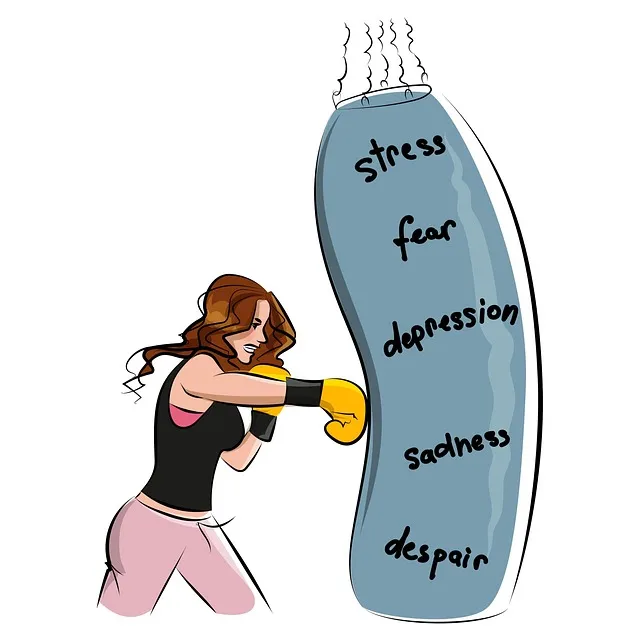Longmont Kaiser Permanente emphasizes understanding stress mechanisms for effective management, promoting emotional intelligence and healthy lifestyle changes like balanced eating, exercise, and sleep to reduce stress. They offer Trauma Support Services with mindfulness meditation and self-awareness exercises, plus cognitive techniques to challenge negative thoughts. Mindfulness activities, from breathing exercises to structured meditation, build inner strength and calm, reducing stress and improving mental wellness while fostering understanding and self-compassion.
Stress reduction is a vital aspect of maintaining optimal mental health, as chronic stress can have detrimental effects on overall well-being. This article explores comprehensive methods to manage stress, guided by experts from Longmont Kaiser Permanente Mental Health. We delve into the causes and impact of stress on mental health, offering practical lifestyle changes, cognitive techniques, relaxation practices, and mindfulness activities to equip individuals with powerful tools for a more balanced life.
- Understanding Stress and Its Impact on Mental Health
- Lifestyle Changes for Effective Stress Reduction
- Cognitive Techniques to Manage Stress
- Exploring Relaxation Practices and Mindfulness Activities
Understanding Stress and Its Impact on Mental Health

Stress is a natural response to various life challenges and demands, but when it becomes chronic, it can significantly impact mental health. Longmont Kaiser Permanente mental health experts emphasize that understanding stress mechanisms is crucial for effective management. Prolonged exposure to stress hormones can lead to anxiety, depression, and even physical ailments such as cardiovascular diseases.
The concept of emotional intelligence plays a vital role in navigating stress. Mental health professionals often incorporate trauma support services and risk assessment tools to help individuals process and cope with stressful events. By recognizing and managing emotions effectively, one can build resilience, which is essential for maintaining overall well-being. This approach not only benefits individuals but also contributes to the holistic mission of Longmont Kaiser Permanente in supporting mental health.
Lifestyle Changes for Effective Stress Reduction

Adopting lifestyle changes can significantly impact your stress levels and overall mental wellness. Longmont Kaiser Permanente offers valuable resources for those seeking effective stress reduction strategies. One of the key aspects is prioritizing self-care, which includes maintaining a balanced diet, engaging in regular physical activity, and ensuring adequate sleep. These foundational practices help regulate mood and reduce the body’s stress response over time.
Additionally, integrating Trauma Support Services into your routine can be transformative for managing chronic stress. Mental health professionals provide tools like mindfulness meditation and self-awareness exercises to process past traumas and foster resilience. By combining these techniques with a healthy lifestyle, individuals can enhance their ability to cope with stressful situations, leading to improved mental health and overall quality of life.
Cognitive Techniques to Manage Stress

Cognitive techniques offer powerful tools to manage stress, as endorsed by Longmont Kaiser Permanente mental health experts. This involves challenging negative thoughts and replacing them with more positive, realistic ones. For instance, if you find yourself thinking, “I can’t handle this,” counter it with, “I’ve faced challenges before and grown from them.” Techniques like mindfulness meditation also play a crucial role in stress reduction by helping individuals stay present and focused on the here and now, thereby reducing anxiety about the future or regrets about the past.
Developing a self-care routine that includes mental wellness journaling exercises can significantly contribute to better mental health, as it provides an outlet for processing emotions and thoughts. This practice allows you to track your progress over time, identify stress triggers, and develop effective coping strategies. In light of the above, fostering mental health through cognitive techniques, self-care routines, and journaling can be a game-changer in navigating life’s stressful situations, ultimately enhancing overall mental wellness.
Exploring Relaxation Practices and Mindfulness Activities

Exploring Relaxation Practices and Mindfulness Activities is a significant step towards stress reduction, as advocated by Longmont Kaiser Permanente mental health professionals. These practices can range from simple breathing exercises to more structured mindfulness meditation. Incorporating such techniques into daily routines can help individuals cultivate inner strength and develop a sense of calm amidst life’s challenges.
Mindfulness, in particular, has gained recognition for its effectiveness in managing stress and improving overall well-being. It involves paying attention to the present moment without judgment, thereby fostering a deeper connection with one’s thoughts and emotions. Longmont Kaiser Permanente mental health services emphasize that regular mindfulness activities can not only reduce stress but also contribute to Mental Illness Stigma Reduction Efforts by promoting understanding and self-compassion. Conflict Resolution Techniques often benefit from mindfulness as it helps individuals approach conflicts with clarity and composure, leading to more constructive outcomes.
Stress reduction is a holistic process that can significantly improve one’s mental health, as highlighted by Longmont Kaiser Permanente mental health experts. By understanding stress and its impact, making lifestyle changes, employing cognitive techniques, and exploring relaxation practices, individuals can navigate life’s challenges more effectively. Incorporating these methods into daily routines offers a comprehensive approach to well-being, empowering folks to foster resilience and enhance their overall mental health journey.






